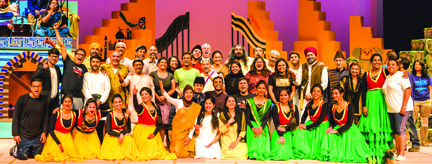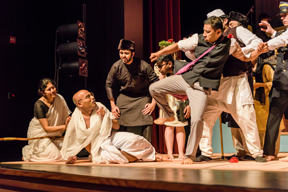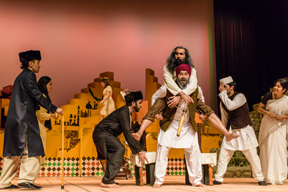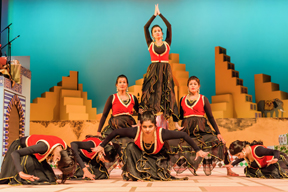 Toba Tek Singh”, a grand musical, claimed as the largest production in Naatak’s 22-year history was staged at Woodside High School, and is based on the historical events surrounding the partition of the Indo-Pakistan subcontinent. The play is a stage adaptation of the original story by Saadat Hasan Manto written in 1955, and Sujit Saraf, the founder of Naatak, takes some directorial liberties with the cast and characters in a unique approach to the story telling. The original intent of a heartwarming entertainer is preserved, and quiet moments of reflection and pathos regularly seep through to tug at heartstrings and portray the irony of the Partition.
Toba Tek Singh”, a grand musical, claimed as the largest production in Naatak’s 22-year history was staged at Woodside High School, and is based on the historical events surrounding the partition of the Indo-Pakistan subcontinent. The play is a stage adaptation of the original story by Saadat Hasan Manto written in 1955, and Sujit Saraf, the founder of Naatak, takes some directorial liberties with the cast and characters in a unique approach to the story telling. The original intent of a heartwarming entertainer is preserved, and quiet moments of reflection and pathos regularly seep through to tug at heartstrings and portray the irony of the Partition.
Nachiketa Yakkundi, a prominent local Hindustani vocalist makes the stage come alive with his soulful, entertaining and somber numbers, matching the appropriate mood for the unfolding story on stage. His booming classical opener instantly draws in the audience, as does the dance troupe livening up the stage with colorful costumes and energetic choreography by Shaira Bhan and Snigdha Singh. The new venue with its spacious seating and pastel side panels was additionally conducive for a total immersive experience.
 Saraf handles the theme deftly by recreating the historical events leading up to the decision to divide the subcontinent, with a cast of political characters comprising the Hindu, Sikh and Muslim leaders, along with Lord and Lady Mountbatten. Characters portraying the captivating personalities of Gandhi, Nehru, Jinnah, Sarojini Naidu,
Saraf handles the theme deftly by recreating the historical events leading up to the decision to divide the subcontinent, with a cast of political characters comprising the Hindu, Sikh and Muslim leaders, along with Lord and Lady Mountbatten. Characters portraying the captivating personalities of Gandhi, Nehru, Jinnah, Sarojini Naidu,
Master Tara Singh and Nathuram deliver a punch with their antics. The story revolves around the dilemma of relocating lunatics residing in their respective mental hospitals to the country of their faith, so Hindu and Sikh lunatics populate India, while Muslim ones are to be in Pakistan.
As the drama unfolds, the on-stage histrionics are slapstick, comical and farcical. The lunatics consider themselves sane and let the audience in on the insanity of the Partition and its human toll. The stark, crazed, mute, (except for speaking occasional gibberish), Bishan Singh, otherwise called Toba Tek Singh named after his birthplace, conveys the bewilderment and ensuing confusion following this decision.
 The political cast transforms into the lunatic cast, assuming the original identities, but now speaking the language of the insane: a clever directorial twist that added a layer of complexity to the musical. Naidu, breaking into poetry, Nathuram ranting and railing against the Partition, Gandhi insisting on a farcical fast, Mountbattens bickering, are some of the staged vignettes that bring alive the mayhem and utter confusion of the times.
The political cast transforms into the lunatic cast, assuming the original identities, but now speaking the language of the insane: a clever directorial twist that added a layer of complexity to the musical. Naidu, breaking into poetry, Nathuram ranting and railing against the Partition, Gandhi insisting on a farcical fast, Mountbattens bickering, are some of the staged vignettes that bring alive the mayhem and utter confusion of the times.
In the final symbolic moments of the division, a wooden chair is sawed into two with Toba Tek Singh standing on it, who, unable to grasp the reality falls through in the middle…in no man’s land. As one audience member aptly put it, “the play focused on an uplifting aspect of the insane who were blissfully unaware of the bigger picture and the mayhem surrounding them”.
 The production is layered with haunting musical numbers; dances, which are jubilant at times, and somber at others, convey the sense of the tragicomedy in subtle and not so subtle ways. Lyrics by Saraf are commendable in their creativity, as is the original score by Yakkundi. The interesting bi-level sets had a slide connecting the two levels which further added to the disorientation of the lunatics as they slip slide their way between the levels.
The production is layered with haunting musical numbers; dances, which are jubilant at times, and somber at others, convey the sense of the tragicomedy in subtle and not so subtle ways. Lyrics by Saraf are commendable in their creativity, as is the original score by Yakkundi. The interesting bi-level sets had a slide connecting the two levels which further added to the disorientation of the lunatics as they slip slide their way between the levels.
In a sensitive scene at the Wagah border, the lunatics sing the national anthems of the two countries, while the background depicts starkly Hindu and Muslim signages. Their loyalties seemed as befuddled as they themselves.
Such a drama is indeed relevant today, given the lack of progress between the two countries since the days of the Partition till present times, and the heightened religious divisions that further strain any understanding of one another’s cultures. The fallout of political maneuverings remains the common man, who gets divided in loyalties between the land of birth, and that of honor.
Archana Asthana






